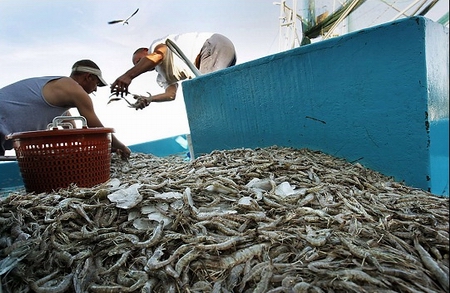
The Trans-Pacific Partnership (TPP) is a proposed multinational trade agreement intended to further liberalize the economies of the Asia-Pacific region. If approved, its most-likely impact on the U.S. seafood market would be an influx of farmed Vietnamese and Malaysian shrimp — to the detriment of Gulf Coast shrimpers.
Provisions of the deal still kept secret could have wide ranging effects.
TPP has been under negotiation since 2010. Australia, Brunei, Canada, Chile, Japan, Malaysia, Mexico, New Zealand, Peru, Singapore, the U.S. and Vietnam are the current negotiating partners.
The United States already has free trade agreements (FTAs) that include seafood trade with many of the participants. For example, Chile is a major exporter of farmed salmon to the U.S., but tariffs on most Chilean products are already at zero and others are scheduled to be eliminated by 2015 under an existing FTA. So, there would be no effect on tariff rates.
The countries that do not have an FTA with the U.S. are Brunei, Japan, Malaysia, New Zealand and Vietnam. Vietnamese and Malaysian farmed shrimp are the most likely products to benefit from greater U.S. market access.
Japan has an existing FTA with Vietnam that covers shrimp, but market access has been hindered by discovery of the banned chemicals trifluralin and enrofloxacin in the product. Malaysia is a concern because of re-export of Chinese shrimp to the U.S. via Malaysia to avoid restrictions on Chinese products banned over health concerns.
Food safety was raised as a possible obstacle to the agreement by Senator Mary Landrieu of Louisiana, Congresswoman Rosa DeLauro of Connecticut and Congressman Walter Jones of North Carolina in a letter late last year to former U.S. trade representative Ron Kirk. They urged him to pursue bilateral agreements with Vietnam and Malaysia to address these concerns.
Their letter particularly asked agreements on sanitary and phytosanitary rules, but bilateral negotiations may also end up producing some form of managed trade, such as voluntary quotas. While not true free trade, such provisions are often included in FTAs, being necessary to prevent opposition.
The legislators are backed by the lobbying group Southern Shrimp Alliance (SSA). This group is well funded due to a former U.S. law, the “Continued Dumping and Subsidy Offset Act” (also called the Byrd Amendment) that awarded anti-dumping duties to the injured U.S. companies.
Vietnam has recently been successful in the World Trade Organization in challenging U.S. anti-dumping determinations and the practice of zeroing. Zeroing means excluding cases from the E.U. and Japan where prices were above the U.S. average, when calculating average export prices to see whether export prices were lower than domestic Vietnamese prices. TPP could give Vietnam and Malaysia a new international venue to challenge U.S. trade restrictions through mandatory mediation.
The proposals in the TTP go far beyond tariffs on trade in goods, to cover sanitary and phytosanitary measures, labor rights, environmental protection, intellectual property, financial and telecommunications services, government procurement, rules of origin, transparency of regulations and support to state-owned enterprises. But many aspects of the deal are still kept secret and will only be divulged when the details are finalized.
This, along with the likelihood that President Obama will ask for fast-track authority this year to limit congressional debate and discussion of the treaty, has raised concerns that these provisions will give undue rights to multinational corporations at the expense of national prerogatives. Many industry representatives are given privileged access to negotiations, while congressional access has been severely restricted.
These still-secret provisions of the deal could have big effects and some of these could be beneficial to U.S. interests. For example, Japan might be forced to accept genetically-modified foods (currently banned for human consumption there) unless it can scientifically justify a ban. Mexico may have to allow private investment in the oil industry in competition with the state-run PEMEX oil company, and Vietnam might have to divest from state-owned textile factories.
For the U.S. fishing industry, there is concern that any attempt to prevent the buying up of catch share quotas by foreign-controlled corporations could run afoul of such agreements, allowing foreign control of the resource.





